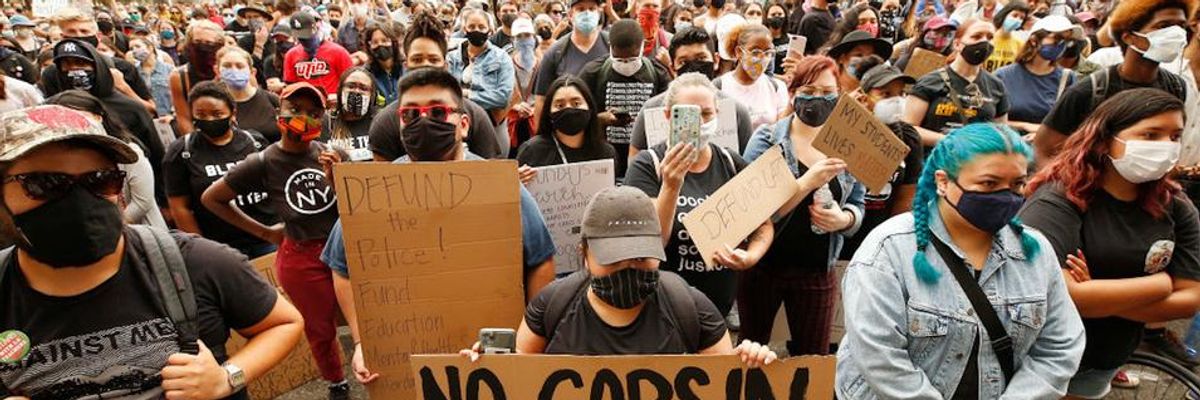More than two-thirds of students surveyed for a report published Tuesday by a coalition of community advocates say in-house police should be removed from schools, with large numbers of pupils also saying they feel unsafe around officers and many of the youth--more than 90% of whom were people of color--reporting being harassed or mocked by campus cops.
"To have police officers at school is a reminder that we must be on guard. Whenever I walk by an officer I hold my breath, take my hands out of my pocket, and try to stand up straight. I'm scared."
--Desiree Reyes,
Nevada student organizer
The report, entitled Arrested Learning: A Survey of Youth Experiences of Police and Security at School (pdf), was released by the Center for Popular Democracy (CPD) in collaboration with staff and young people from Make the Road New York (MRNY), Make the Road Nevada (MRNV), Latinos Unidos Siempre (LUS), the Urban Youth Collaborative (UYC), and the the Research Hub for Youth Organizing at the University of Colorado Boulder.
The release of the report marks the launch of a week of action by these organizations "to demand that federal, state and local elected officials take immediate action to remove police from schools and end the school-to-prison-and deportation pipeline."
The groups' staff surveyed 630 students in Nevada, New Jersey, New York, and Oregon. Of the respondents with police at their schools, 41% said they felt unsafe or very unsafe when they see officers, with only 16% saying that campus cops make them feel safe. On the other hand, respondents said that friends (84%) and teachers (63%) made them feel safe.
A third of survey respondents have felt targeted by police based on race, primary language, sexual orientation, or gender identity--including transgender, gender non-conforming, and intersex. Nearly two-thirds reported experiencing or knowing someone who has experienced negative interactions with police at their schools. Among Black and Latinx students--who were also more likely to be targeted at metal detectors than other students--that figure rose to nearly three-quarters.
"I feel traumatized by them and purposely avoid seeing them or interacting with them," said one student about campus cops.
"I do not feel safe because I've witnessed their abuse of power and refusal to help me when I asked," said another. "They also ridicule the students and try to make them feel small."
Desiree Reyes, a youth member of Make the Road Nevada, said in a statement that "to have police officers at school is a reminder that we must be on guard. Whenever I walk by an officer I hold my breath, take my hands out of my pocket, and try to stand up straight. I'm scared."
"I know half of the young people in our district probably feel the same way," added Reyes. "We need police-free schools."
For some students, the abuse went far beyond verbal harassment. Ten percent of survey respondents said they have been physically assaulted by school police or security officers, 10% said they'd been pepper-sprayed, and young people in three of the four surveyed jurisdictions said they or someone they know has been sexually harassed by campus cops.
Other students reported being forced into what the survey's authors call the "school-to-prison-and-deportation pipeline" as a result of interactions with campus cops. One in four of the surveyed students have been arrested, while nearly one in five has had police respond when they miss school, 18% have been issued juvenile reports, and 16% have received court citations.
"These types of interactions can have devastating impacts for young people," the report states. "One study found that experiencing an arrest for the first time in high school nearly doubles the odds of a student dropping out, and a court appearance nearly quadruples the odds of a student dropping out."
"Students who were first arrested during the 9th or 10th grade were six to eight times more likely to drop out of school than students who were not arrested," it continues. "Rather than reduce school violence, scholars have found that the presence of police merely criminalizes typical adolescent behavior, such as disorderly conduct, even among similarly situated schools."
Kate Terenzi, one of the report's lead authors and senior policy and campaign strategist at the Center for Popular Democracy, said that "the school-to-prison-and-deportation pipeline is one of the most egregious examples of systemic racism and state-sanctioned violence in our country."
"The school-to-prison-and-deportation pipeline is one of the most egregious examples of systemic racism and state-sanctioned violence in our country."
--Kate Terenzi, CPD
"For too long abusive policing has dominated school hallways and stifled students' education, funneling them into the criminal legal system," she added. "Students deserve more than an education system that is hell-bent on criminalizing them instead of providing them with the resources they need to succeed."
When asked what they would like to see more of, or improved, at their schools, students overwhelmingly said programs, resources, and support--not police and security officers. More than three quarters, for example, said they would like more dedicated youth-led programs to increase access to college and financial aid.
CPD is leading youth organizers across the nation in calling on the Biden administration, Congress, and state and local leaders to adopt the Youth Mandate for Education and Liberation, which is endorsed by more than 150 organizations and "demands that officials fund education, not incarceration, restore and strengthen young people's civil rights in education, uplift public education, and end the private takeover of schools."

